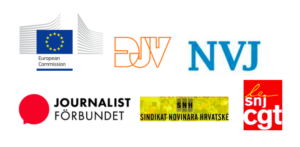WPFD: EFJ calls for a systemic approach on journalists’ safety

The European Federation of Journalists (EFJ) organised, on the occasion of the World Press Freedom Day, a 1.5 day conference on the safety of journalists. Held at the Bozar in Brussels, the conference brought together journalists, experts, representatives of the EU and trade unions to discuss the safety of journalists, both physically and psychologically.
If journalists and media workers are not protected, democracies are endangered
The conference opened with a minute of silence for killed journalists around the world. Figures show that Europe has become a dangerous place for media professionals: for the year 2022, the Media Freedom Rapid Response (MFRR) recorded 813 violations of media freedom in the EU Member States and candidate countries, involving 1,339 individuals or media outlets. Safety mechanisms need to be put in place by the EU and national institutions, as well as the media houses to help the whole profession, especially at a time when trust in the media is declining.
“By protecting journalists and their safety, we are also protecting media as such,” said European Commission Vice-President Vera Jourova during her keynote speech.
Recently, the war in Ukraine has raised the questions of the safety of journalists going on the front-line. Are they sufficiently supported and prepared? A report published in 2022 showed that journalists lack training, protective equipments and support from their employers and colleagues.
It is precisely for this reason that the EFJ developed a risk assessment tool designed to help journalists and media workers knowing the challenges they might face when preparing for their new assignment.
Talking at the panel “Empowering journalists to fight against attacks”, veteran war correspondent Marc Marginedas shared his experience. He had been abducted for six months in Syria by a group of insurgents. He remembered: “I never did a course on what to do if you’re being kidnapped. When you’re in captivity, you have to understand that all information you share can be used against you.”
The need for a systemic approach to the safety of journalists
With other experiences from journalists, the question of the importance of peer support was widely shared by the speakers. A high number of journalists have experienced traumas; many of them reported feelings of “isolation”, indicating that we need more systemic approach to mental health risks. “Is the media having a collective burnout?” was the question of the third panel, during which Gavin Rees, Senior Advisor at Dart Center, wondered how much stress journalists can take, especially when driven by a story or working on breaking news.
“We can work for long periods on breaking news assignments only if we have the ability to rest and recover.”
As repeatedly demonstrated, peer support, if essential in itself, is not enough: quid of the role of the employers? Media companies need to have protocols and strategies in place for when journalists are targeted online and offline.
Institutions are also instrumental in implementing strategies for the protection of the media. The European Commission is working on a set of regulations and on the implementations of standards on journalists’ safety, for instance, with the work done on the European Media Freedom Act (EMFA). Intervening on the panel focused on the duty of care for journalists, Rodica Ciochina announced the launch of a Council of Europe campaign for the safety of journalists next October. The campaign aims for changes in national laws and for each Member State to implement an action plan and raise public awareness, she explained. Wouter Gekiere, Head of the European Broadcasting Union (EBU), insisted on the need to work hand-in-hand with partner organisations to amplify voices on important issues such as the protection of sources or the funding of independent media.
Examples of best practices
Journalists’ unions should help making the link between the journalists, employers and institutions to initiate social dialogue. The Netherlands, Germany and Greece were quoted as implementing good practices. A multi stakeholder approach with the PersVeilig mechanism in the Netherlands, which includes a tool for journalists to report violations to press freedom and interferences with their work, an International Training Centre in Greece, supported by the Journalists’ Union of Macedonia and Thrace (ESIEMTH), and trainings with the police and discussions with the Ministry of Interior in Germany were presented in more details. The overall goal is to create a better culture of safety for journalists: by staying safe, you can report better, reminded Yannis Kotsifos, director of ESIEMTH.
Ricardo Gutiérrez, General Secretary of the EFJ, concluded the day: “I believe that together we can help improving the safety of journalists around the world, so please continue reporting attacks on journalists and use the risk assessment tool we just launched. It is important to spread a culture of safety.”







